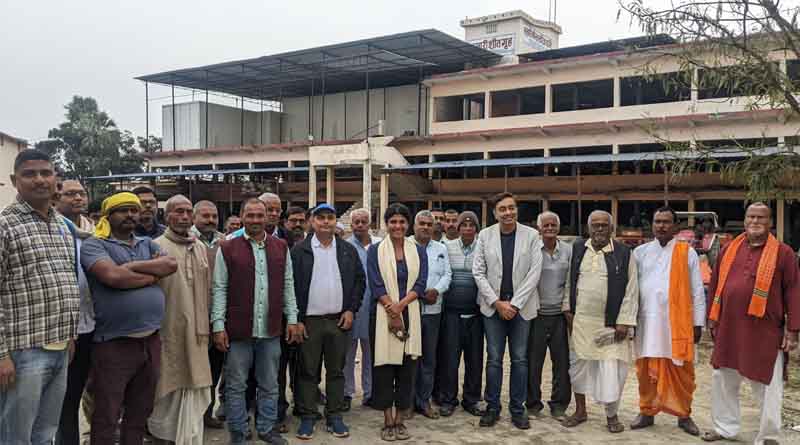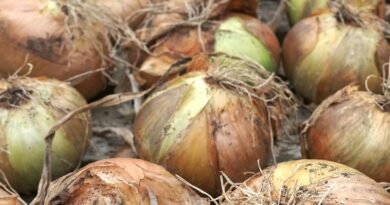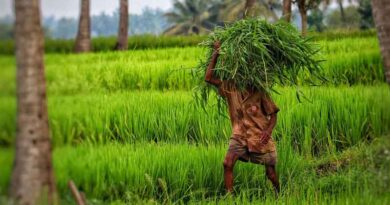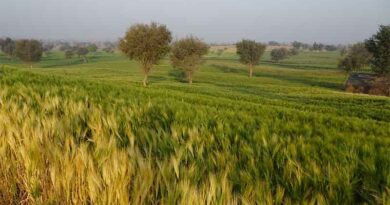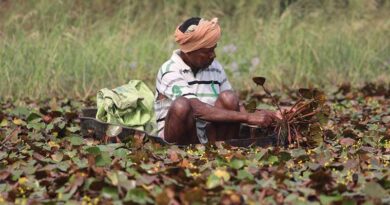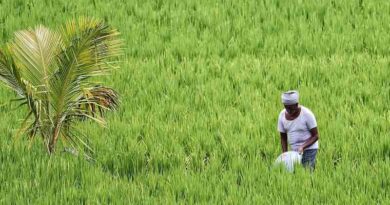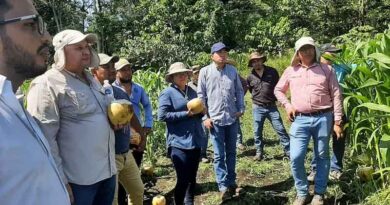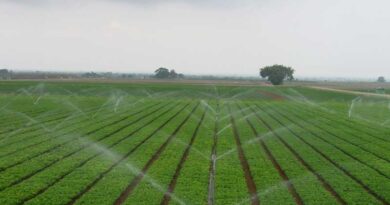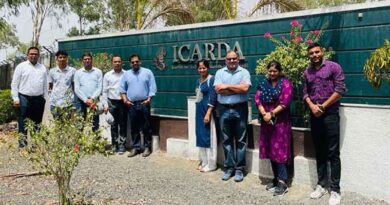A marine engineer embarks on making life easier for farmers in his native village, by establishing a one-stop shop agri-business center
The Bhusari Cold Storage in Begusarai, Bihar, has helped build the capacity of over 25,000 smallholder farmers through improved access to farming resources, advanced technologies, and advisories on climate-resilient agri-practices and allied services.
20 March 2024, New Delhi: On the northern banks of the Ganges lies the city of Begusarai, in India’s Bihar State. Amid the expected structures of a city—temples and transit hubs—is a five-acre business hub dedicated to agriculture. This center, called the Bhusari Cold Storage Center, includes a 7,000-ton cold storage facility for vegetables, a dry grain storage area, outlets for farmer inputs and outputs, a farmer training center, a soil testing laboratory, and a farm implement bank. The brainchild of Navneet Ranjan, this facility works in collaboration with state partners, CIMMYT, and the Cereal System Initiative for South Asia (CSISA) project.
In the decade since its formation, the center has served nearly 100 villages in and around Begusarai, helping thousands of smallholder farmers access equipment, knowledge, and seeds they otherwise do not have access to.
“Since coming to the center I have not only benefited in using mechanized services at a small price but also learned about new schemes and incentives provided to smallholder farmers by the government,” said Ram Kumar Singh, a farmer from the village of Bikrampur. A similar story was related by Krishadev Rai from the village of Sakarpura, who said the laser land leveler machine at the center dramatically lowered costs associated with irrigation and other inputs, including information about different fertilizers and varietal seeds available at the market.
Farmers from the region have benefited immensely from the services of the center. According to Anurag Kumar, a CIMMYT senior research associate with CSISA, “The existence of the state-of-the-art center in the last decade has helped over 25,000 smallholder farmers avail themselves of services and information on farming and agriculture.” He said the center has also helped promote conservation agriculture technologies, implement climate-resilient farming practices, and build the capacity of smallholder farmers.
Ranjan, a native of the region, is a marine engineer by education but has diversified experiences from different sectors. A decade ago, Ranjan returned home after pursuing higher education and working in distant cities in India and abroad.
Ranjan met recently with CSISA representatives to share his motivation, hopes, and aspirations about the reach and impact of the Bhusari Center for farmers of Begusarai and beyond.
How did the Bhusari Agri-business center, popularly known as Bhusari Cold Storage, come into being?
In 2012, driven by a deep-rooted desire to bridge the significant societal gap between my professional advancements in the corporate world and the enduring struggles within my rural hometown in Bihar, I founded the Bhusari Agri-business Center. The name “Bhusari” was thoughtfully chosen, as it represents approximately 50 villages in the area, traditionally, and collectively known by this moniker, underscoring our commitment to the region’s agricultural heritage and community.
From the start, we knew we wanted our center, born from a combination of my family’s initial investment and funding secured through a State Bank of India loan alongside a significant subsidy from the Government of Bihar, to serve as a comprehensive agri-business solution. We designed this project not only as a business venture but as a social enterprise aimed at improving the livelihoods of local farmers by ensuring better returns for their produce, disrupting the traditional agricultural value chain that often left them exploited.
The establishment of Bhusari Cold Storage stands as a testament to the potential of marrying native understanding with professional management to foster socio-economic development in rural areas.
What has been your biggest achievement with the establishment of Bhusari Cold Storage?
If I were to pinpoint our most significant achievement, it would be the creation of the farm implement bank. This initiative has helped revolutionize the agricultural landscape for the small-scale farmers in our area by providing them with access to modern farming equipment.
Before the inception of this bank, many farmers in our region faced challenges because of outdated farming techniques and the lack of access to modern machinery, which often resulted in inefficient farming practices and high operational costs. Introducing zero tillage, planters, harvesters, and especially the laser land leveler, has been a game-changer. This farm implement bank has also popularized the use of advanced agricultural technologies among the farming community. The positive effects of these modern farm implements have been many, including reduced labor costs, improved crop yields, and more sustainable farming practices.
How has a project like CSISA and other partners supported farmers and the efforts of agri-entrepreneurs like you in the region?
The support from CSISA and its partners has helped enhance the capabilities of farmers and bolster the efforts of agri-entrepreneurs in the region. CSISA’s contribution, particularly through its project scientists and field technicians, has been pivotal in training farmers. This collaboration has led to a significant increase in awareness and adoption of advanced agricultural implements and practices, including zero tillage and land levelers, among the farming community.
The center has conducted extensive training programs for many farmers, thanks to the resources, knowledge, and technology facilitated by CSISA, the State Department of Agriculture, and Krishi Vigyan Kendra (KVK). This partnership has enabled us to disseminate knowledge and tools to the farmers and drive the adoption of innovative farming techniques that lead to higher efficiency and reduced costs. The collaboration with CSISA and state partners has been a cornerstone in our mission to modernize agriculture in the region, making significant strides towards sustainable farming practices, and enhancing the livelihoods of the local farming community. Through these collective efforts, we have been able to empower farmers with the skills and technologies necessary to thrive in a competitive and evolving agricultural landscape.
What do you hope for next for Bhusari or other endeavors in agri-business to support smallholder farmers?
Looking ahead, our vision for Bhusari and future agri-business endeavors deeply focuses on empowering smallholder farmers by enhancing their access to financial resources and tailored agricultural solutions. By addressing the financial barriers that often hinder farmers’ ability to invest in their operations, we aim to unlock new opportunities for growth and innovation in the agricultural sector. A key priority is to streamline the process so that these farmers can obtain credit lines and working capital more efficiently.
Additionally, recognizing farmers’ diverse needs and challenges in different regions, we are committed to making customized farm implements more readily available. These tailored tools are essential for increasing agricultural efficiency and productivity, as farming practices and conditions vary greatly across regions. To complement these efforts, we plan to expand our training programs and provide more customized knowledge to farmers.
Ultimately, the aim is to scale up this model and create several other replicable projects across Bihar and beyond. By demonstrating the success of these initiatives, we hope to inspire and facilitate similar transformations in other regions, fostering a more sustainable, efficient, and prosperous agricultural landscape for smallholder farmers.
Also Read: Best Agrolife’s Patented Product ‘Defender’ to Be Available for Indian Farmers From May 2024
(For Latest Agriculture News & Updates, follow Krishak Jagat on Google News)

